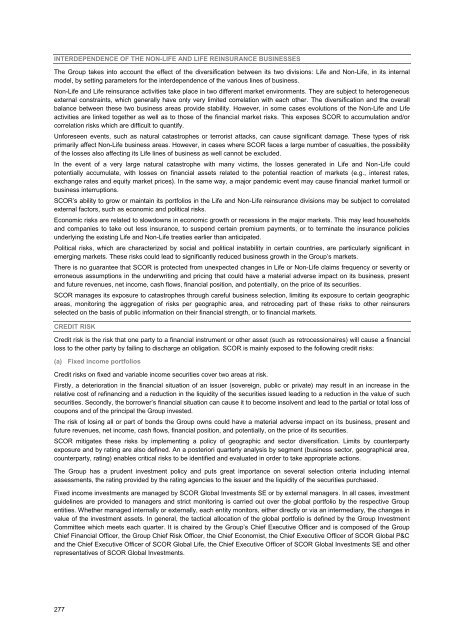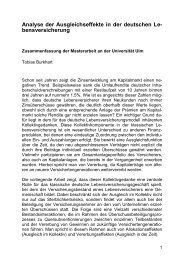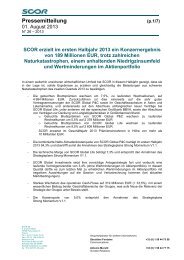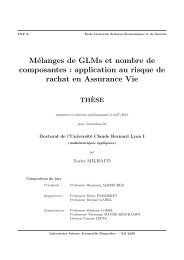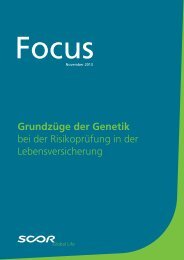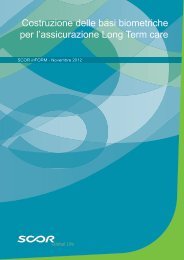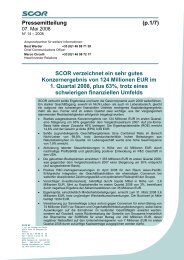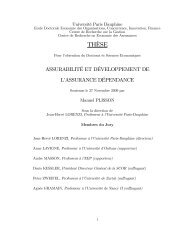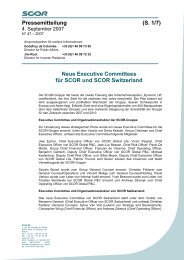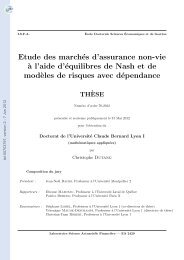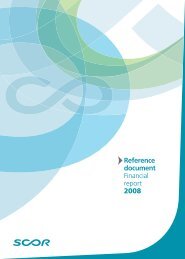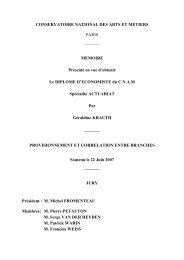4.4 Legal risk - Scor
4.4 Legal risk - Scor
4.4 Legal risk - Scor
You also want an ePaper? Increase the reach of your titles
YUMPU automatically turns print PDFs into web optimized ePapers that Google loves.
INTERDEPENDENCE OF THE NON-LIFE AND LIFE REINSURANCE BUSINESSES<br />
The Group takes into account the effect of the diversification between its two divisions: Life and Non-Life, in its internal<br />
model, by setting parameters for the interdependence of the various lines of business.<br />
Non-Life and Life reinsurance activities take place in two different market environments. They are subject to heterogeneous<br />
external constraints, which generally have only very limited correlation with each other. The diversification and the overall<br />
balance between these two business areas provide stability. However, in some cases evolutions of the Non-Life and Life<br />
activities are linked together as well as to those of the financial market <strong>risk</strong>s. This exposes SCOR to accumulation and/or<br />
correlation <strong>risk</strong>s which are difficult to quantify.<br />
Unforeseen events, such as natural catastrophes or terrorist attacks, can cause significant damage. These types of <strong>risk</strong><br />
primarily affect Non-Life business areas. However, in cases where SCOR faces a large number of casualties, the possibility<br />
of the losses also affecting its Life lines of business as well cannot be excluded.<br />
In the event of a very large natural catastrophe with many victims, the losses generated in Life and Non-Life could<br />
potentially accumulate, with losses on financial assets related to the potential reaction of markets (e.g., interest rates,<br />
exchange rates and equity market prices). In the same way, a major pandemic event may cause financial market turmoil or<br />
business interruptions.<br />
SCOR’s ability to grow or maintain its portfolios in the Life and Non-Life reinsurance divisions may be subject to correlated<br />
external factors, such as economic and political <strong>risk</strong>s.<br />
Economic <strong>risk</strong>s are related to slowdowns in economic growth or recessions in the major markets. This may lead households<br />
and companies to take out less insurance, to suspend certain premium payments, or to terminate the insurance policies<br />
underlying the existing Life and Non-Life treaties earlier than anticipated.<br />
Political <strong>risk</strong>s, which are characterized by social and political instability in certain countries, are particularly significant in<br />
emerging markets. These <strong>risk</strong>s could lead to significantly reduced business growth in the Group’s markets.<br />
There is no guarantee that SCOR is protected from unexpected changes in Life or Non-Life claims frequency or severity or<br />
erroneous assumptions in the underwriting and pricing that could have a material adverse impact on its business, present<br />
and future revenues, net income, cash flows, financial position, and potentially, on the price of its securities.<br />
SCOR manages its exposure to catastrophes through careful business selection, limiting its exposure to certain geographic<br />
areas, monitoring the aggregation of <strong>risk</strong>s per geographic area, and retroceding part of these <strong>risk</strong>s to other reinsurers<br />
selected on the basis of public information on their financial strength, or to financial markets.<br />
CREDIT RISK<br />
Credit <strong>risk</strong> is the <strong>risk</strong> that one party to a financial instrument or other asset (such as retrocessionaires) will cause a financial<br />
loss to the other party by failing to discharge an obligation. SCOR is mainly exposed to the following credit <strong>risk</strong>s:<br />
(a) Fixed income portfolios<br />
Credit <strong>risk</strong>s on fixed and variable income securities cover two areas at <strong>risk</strong>.<br />
Firstly, a deterioration in the financial situation of an issuer (sovereign, public or private) may result in an increase in the<br />
relative cost of refinancing and a reduction in the liquidity of the securities issued leading to a reduction in the value of such<br />
securities. Secondly, the borrower’s financial situation can cause it to become insolvent and lead to the partial or total loss of<br />
coupons and of the principal the Group invested.<br />
The <strong>risk</strong> of losing all or part of bonds the Group owns could have a material adverse impact on its business, present and<br />
future revenues, net income, cash flows, financial position, and potentially, on the price of its securities.<br />
SCOR mitigates these <strong>risk</strong>s by implementing a policy of geographic and sector diversification. Limits by counterparty<br />
exposure and by rating are also defined. An a posteriori quarterly analysis by segment (business sector, geographical area,<br />
counterparty, rating) enables critical <strong>risk</strong>s to be identified and evaluated in order to take appropriate actions.<br />
The Group has a prudent investment policy and puts great importance on several selection criteria including internal<br />
assessments, the rating provided by the rating agencies to the issuer and the liquidity of the securities purchased.<br />
Fixed income investments are managed by SCOR Global Investments SE or by external managers. In all cases, investment<br />
guidelines are provided to managers and strict monitoring is carried out over the global portfolio by the respective Group<br />
entities. Whether managed internally or externally, each entity monitors, either directly or via an intermediary, the changes in<br />
value of the investment assets. In general, the tactical allocation of the global portfolio is defined by the Group Investment<br />
Committee which meets each quarter. It is chaired by the Group’s Chief Executive Officer and is composed of the Group<br />
Chief Financial Officer, the Group Chief Risk Officer, the Chief Economist, the Chief Executive Officer of SCOR Global P&C<br />
and the Chief Executive Officer of SCOR Global Life, the Chief Executive Officer of SCOR Global Investments SE and other<br />
representatives of SCOR Global Investments.<br />
277


